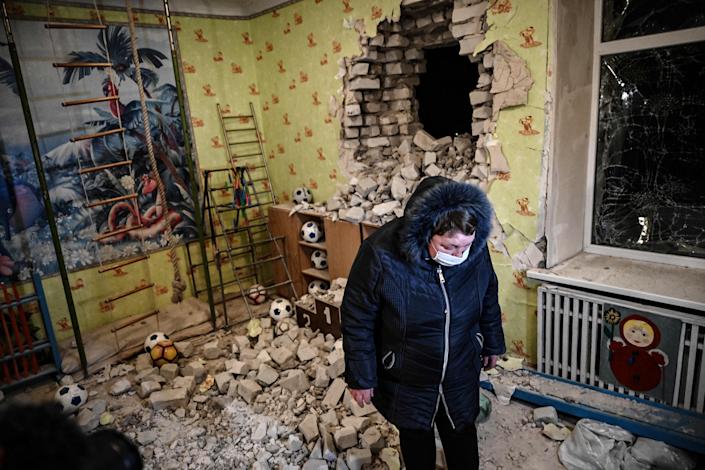Senior U.S. officials pivoted Thursday from warning of the threat that Russia could soon invade Ukraine to the firm expectation the invasion is about to begin.
What they’re saying: “If Russia doesn’t invade, we will be relieved that Russia changed course and proved our predictions wrong,” Secretary of State Tony Blinken said today. But both he and President Biden made quite clear that they believe Vladimir Putin has chosen war, and Blinken went so far as to present the playbook the U.S. expects Putin to follow.
Stay on top of the latest market trends and economic insights with Axios Markets. Subscribe for free
First, Blinken told the UN Security Council, Putin will need a pretext.
-
That could involve a “violent event” precipitated by Russia or “an outrageous accusation” against Ukraine, Blinken said.
-
He cited the possibility of a fabricated terrorist bombing, drone strike against civilians or chemical weapons attack. Blinken also said Russia could falsely claim that “ethnic cleansing or a genocide” is taking place in Eastern Ukraine, or stage the discovery of a mass grave.
-
The latest: Such claims are already being shared by Russian state media and Kremlin officials, including Putin himself.
Second, Blinken warned “the highest levels of the Russian government may theatrically convene emergency meetings to address the so-called crisis” and proclaim the need to rise up and defend Russian citizens or ethnic Russians in Ukraine.
Third, the attack will begin with Russian missiles and bombs across Ukraine, jammed communications and cyberattacks designed to shut down “key Ukrainian institutions,” Blinken said.
-
The latest: The websites of Ukraine’s Defense Ministry and two major banks were knocked offline temporarily on Tuesday by a cyberattack, though no sensitive systems appear to have been affected.
Fourth, “Russian tanks and soldiers will advance on to targets that have already been identified and mapped out in detailed plans,” including Kyiv.
-
The latest: U.S. officials now estimate the troop count near Ukraine’s borders at 150,000. Secretary of Defense Lloyd Austin said today that Russian troops were “inching closer” to Ukraine’s border and “stocking up their blood supplies.” Satellite images have also shown a new military pontoon bridge in Belarus, less than 4 miles from the Ukraine border.
-
“Every indication that we have is that they are prepared to go into Ukraine,” Biden told reporters today. He said he expects an invasion “in the next several days,” but there is still a “path to diplomacy.”
Data: Mapbox/OSCE as of Feb. 14, 2022; Map: Will Chase/Axios
That path appears to be growing shorter.
-
Russia formally replied today to the security proposals the U.S. and NATO presented last month, saying they “ignored” Russia’s core concerns, such as NATO expansion, and that Russia would be forced to take “military-technical” steps in response. Moscow has also expelled a senior U.S. diplomat.
-
At today’s UN hearing on the Minsk accords, which were signed in 2014 and 2015 as part of the effort to resolve the ongoing war in eastern Ukraine, Blinken’s remarks were preceded by a combative address from Russia’s deputy foreign minister.
-
He argued that Ukraine was trampling on the agreements — which call for a “special status” for the separatist-claimed areas of eastern Ukraine, but which Ukraine argues were signed under military duress — with the acquiescence of the West.
While in Moscow this week, German Chancellor Olaf Scholz hinted at two potential off-ramps: making clear that Ukraine will not join NATO anytime soon, and pressuring Kyiv to move forward on Minsk.
Meanwhile, Russian officials and state media have been jeering the Biden administration over the fact that the date it pinpointed for a potential invasion came and went on Wednesday.
-
The Kremlin continues to insist it has no plans to invade Ukraine, though Blinken noted that it hasn’t explicitly ruled out such a scenario or followed through in any meaningful way on the announcement that troops would move back from the border.
State of play: The low-grade war that’s already underway in Ukraine threatened to escalate today as international monitors reported shelling across the line of contact in the east.


The aftermath of the reported shelling of a kindergarten in Stanytsia Luhanska. Photo: Aris Messinis/AFP via Getty
The big picture: Ukraine has since 2014 been battling pro-Russian separatists who’ve declared independent “republics” in Donetsk and Luhansk (see map). Around 1,400 people have been killed in the fighting.
Driving the news: A kindergarten in the Ukrainian-controlled town of Stanytsia Luhanska was struck, though the children had been evacuated and no one was killed. President Volodymyr Zelensky called that a “big provocation.”
-
Meanwhile, Kremlin spokesperson Dmitry Peskov accused Ukrainian government forces of preparing a major offensive against the separatist-controlled territory, which Kyiv has denied.
-
At the UN, Russia is circulating what it describes as an investigation into war crimes committed by Ukrainian forces during the war. A senior U.S. official called those allegations “categorically false,” but warned they could be used to further build a pretext for war.
The Russian state Duma passed a resolution this week calling on Putin to recognize the separatist republics.
-
That would suggest a Russian withdrawal from the Minsk accords and could foreshadow military intervention from Moscow because the separatists do not control all of the territory they claim.
-
Blinken said Russia would face “a swift and firm response” if Putin acts on the resolution, in a statement that was echoed by several European allies.
-
“The Duma provides Putin with possibilities,” Alexander Baunov of Carnegie Moscow tells Axios, but that doesn’t mean he intends to take them.
What to watch: The U.S. has consistently attempted to call out the plays it expects Putin to run ahead of time, hoping to deny him the narrative that the war was forced upon Russia.
-
While the U.S. and U.K. appear convinced that war is coming, some analysts believe Putin is still keeping his options open.
-
Baunov says a full-scale invasion of Ukraine would not be an easy sell for Putin domestically, in part because so many Russian citizens have relatives in Ukraine.
-
“It’s not such an easy decision,” Baunov says. “It maybe doesn’t look this way from the outside, but from inside [Russia], to start a large-scale invasion of Ukraine without being provoked by something convincing — you can threaten it, but to move is a different thing.”
The bottom line: The Biden administration made clear today that it expects Putin to move from threats to action very soon.
More from Axios: Sign up to get the latest market trends with Axios Markets. Subscribe for free




